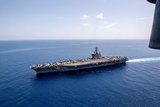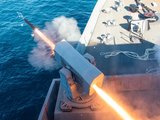Japan’s military enhances transport capability to offshore islands
This JMSDF transport ship LC-2002 is one of only a few Japanese vessels able to utilise small ports. (Photo: Koji Miyake)
The current maritime transport capability of the Japanese military is insufficient to transport troops and supplies to its southwest islands. The FY2023 budget is going some way to address this deficiency.
A logistics support vessel (LSV) and landing craft utility (LCU) will be built to enhance capability. Their construction cost is estimated at JPY10.8 billion ($83 million), and they will be delivered to the Japanese Maritime Self-Defense Force (JMSDF) in 2024.
The LSV, with a cargo capacity of 1,700t, will transport equipment from the mainland to Japan’s southwest islands. The LCU, meanwhile, with a payload capacity of 350t, will
Already have an account? Log in
Want to keep reading this article?
More from Naval Warfare
-
![Raytheon will develop an advanced naval sensing and targeting system for DARPA]()
Raytheon will develop an advanced naval sensing and targeting system for DARPA
RTX’s solution for DARPA’s Pulling Guard programme is intended to provide advanced maritime defence technologies to protect platforms against uncrewed surface vehicles and other threats.
-
![Spain’s F100 upgrade mirrors Aegis modernisation paths in allied navies]()
Spain’s F100 upgrade mirrors Aegis modernisation paths in allied navies
The Spanish Navy’s Alvaro de Bazan-class of air defence frigates will receive the latest Aegis Weapon System technology among other modernisations to extend the service life to 2045.
-
![UK’s Fleet Solid Support ship programme deemed on track despite steel supply concerns]()
UK’s Fleet Solid Support ship programme deemed on track despite steel supply concerns
Shipbuilders are saying the programme is going ahead on time as the government estimates 7.7 million tonnes of steel are needed for 2026 infrastructure projects.
-
![Raytheon unveils details of its proposal for the US Navy/NATO ESSM Next Significant Variant]()
Raytheon unveils details of its proposal for the US Navy/NATO ESSM Next Significant Variant
In an exclusive interview with Shephard, Raytheon’s VP of Shipboard Missiles disclosed what improvements the company plans to offer for the Sea Sparrow NSV.






















